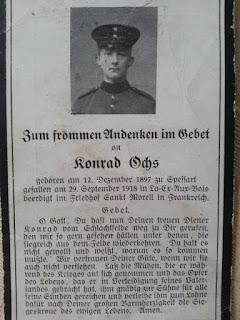 |
| "The Sun Sank In The West" |
"The Sun Sank In The West.
And when you return to the homeland years from now, bring this dear treasure to my sweetheart".
The dying soldier asks his comrade to take his Iron Cross medal (the dear treasure) to his sweetheart. The clear message of the postcard is that he is proud to have died for his country, as he expects his sweetheart to be.
The postcard was one of a set of six cards, each containing lines attributed to the anonymous folk song "Die Sonne Sank im Westen" (The Sun Sank In The West), although the lines have been altered slightly from the original song. In the postcard shown above, the dying soldier states that his comrade will return home "years from now". This was not the general belief in the early months of the war in 1914, when it was expected that everything would be over by Christmas. The postcards were issued in 1915, when it had become clear that the war might continue for several years.
The memorial card of Eduard Waldmann, born on February 3, 1888, in Ettlingen-Spessart. The card states that Eduard fell "on the field of honor" and "died a hero's death on August 20, 1914 in the battles at Brudersdorf, buried in Niederweiler in Lorraine".
He was thus one of the first soldiers to fall from Ettlingen.
A quote from the book of Maccabees is printed at the top of the card: "It is better to die in war than to surrender the homeland to adversity".
Landsturmmann Adalbert Weber was born on May 2, 1889 in Ettlingen-Spessart and served in the Infanterie Regiment 114.
His card states that he "died a hero's death on April 3, 1918 in Cair, Northern France".
The memorial card of Pionier Josef Anton Kraft, of the Minenwerfer-Bataillon 7 (Trench Mortar Battalion). Josef was born on August 24, 1895 in Ettlingen-Spessart and died on January 28, 1918 in Brussels.
His card states that he "fell on the field of honor".
The memorial card of Konrad Ochs, who was born on December 12, 1897 in Ettlingen-Spessart and who fell on September 29, 1918 in La Ex Aux Bois. He is buried in the cemetry St. Morell in France.
His family has written:
"O God, you have called your loyal servant Konrad from the field of battle to you, and we would have been so happy to have seen him again among those who returned victoriously from the field [Konrad fell shortly before the end of the war]. However, it was not your wish and in your wisdom you know why it had to be so. We trust in your benevolence, even if we do not understand it. Let the efforts that he made during the war and the sacrifice of life that he made in the defense of his homeland graciously make reparation for all his sins and allow you to confer on him in return for this, in your great mercy, the crown of victory of eternal life".
The Infanterie Ersatz Bataillon 110, in which some soldiers from Ettlingen-Spessart served. Alfred Schottmüller is shown standing in the back row, 3rd from the left.
The photo shows the battalion in Heidelberg. They were assigned to the 28th Division of the 7th German Army.
All photos and postcard property and copyright of Brigitte Weber of Ettlingen-Spessart




